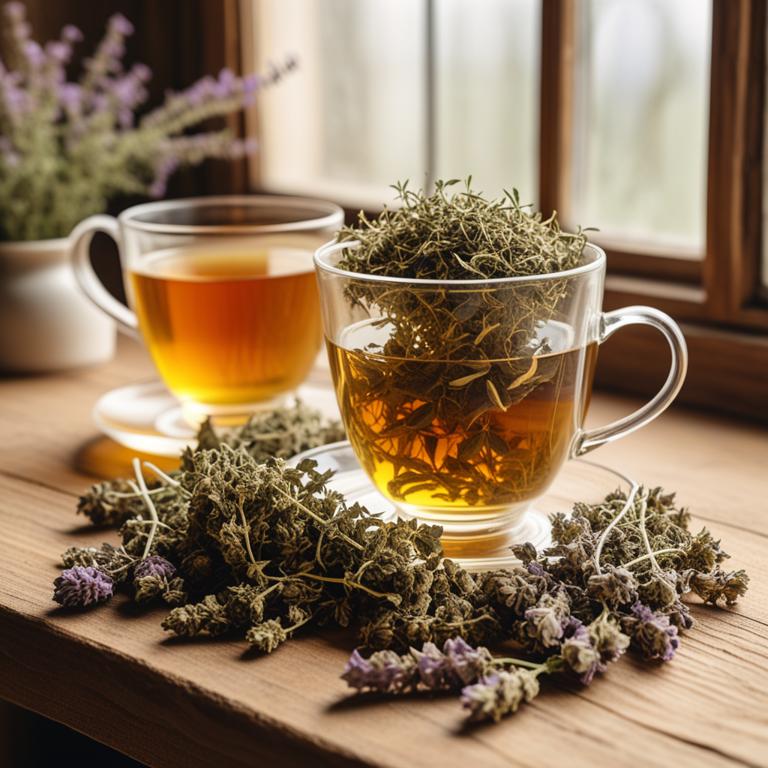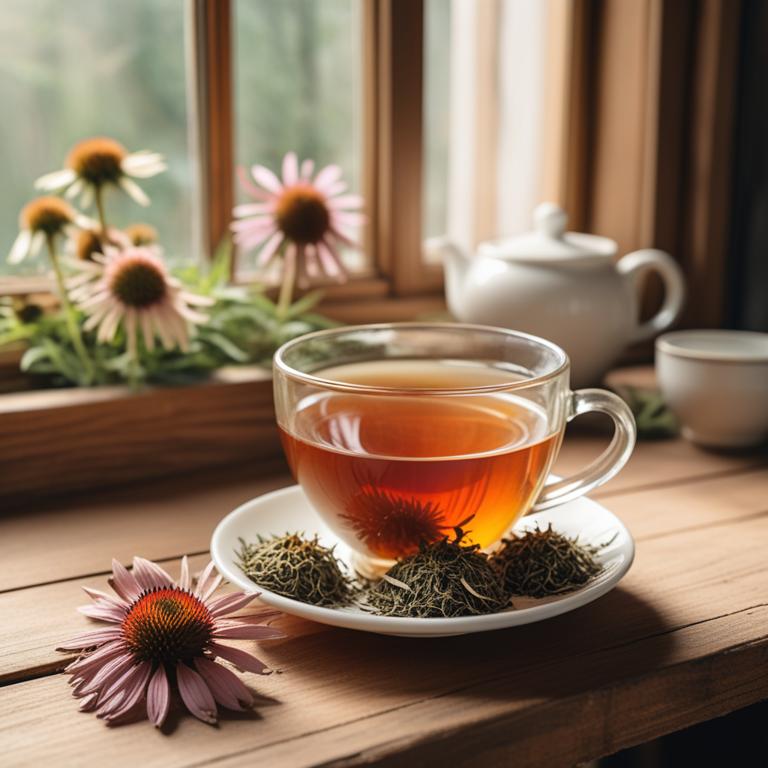9 Best Herbal Teas For Runny Nose

Herbal teas for runny nose are a natural and effective way to alleviate the discomfort associated with excess nasal mucus.
These teas are made from various herbs that possess anti-inflammatory, antihistamine, and decongestant properties, which help to reduce nasal congestion and sinus pressure.
Some examples of herbal teas that can be used to treat runny nose include peppermint tea, which helps to open up airways and ease congestion, ginger tea, which reduces inflammation and soothes the throat, and eucalyptus tea, which has decongestant properties and helps to clear nasal passages.
Additionally, other herbs such as thyme, rosemary, and licorice root tea can also be used to treat runny nose due to their antiviral and antibacterial properties, which help to combat underlying infections and promote overall respiratory health.
According to "Journal of alternative and complementary medicine (New York, N.Y.)", teas for runny nose may be effective in relieving symptoms when consumed as an echinacea compound herbal tea preparation, such as Echinacea Plus, at an early onset of cold or flu symptoms.
Below there's a list of the 9 best herbal teas for runny nose.
- 1. Eucalyptus globulus teas
- 2. Pelargonium sidoides teas
- 3. Echinacea purpurea teas
- 4. Echinacea angustifolia teas
- 5. Melissa officinalis teas
- 6. Eucalyptus radiata teas
- 7. Zingiber officinale teas
- 8. Mentha x piperita teas
- 9. Ginkgo biloba teas
Also you may be interested in...
TODAY'S FREE BOUNDLE
Herb Drying Checklist + Herbal Tea Shopping List + Medicinal Herbs Flashcards
Enter you best email address below to receive this bundle (3 product valued $19.95) for FREE + exclusive access to The Aphotecary Letter.
$19.95 -> $0.00
1. Eucalyptus globulus teas

Eucalyptus globulus teas have been traditionally used to treat the runny nose ailment due to their decongestant, anti-inflammatory, and antimicrobial properties.
The herbal preparation helps to treat this ailment by reducing congestion, relieving nasal discharge, and soothing the nasal passages.
The bioactive constituents of Eucalyptus globulus teas, including eucalyptol, limonene, and cineole, contribute to its therapeutic effects by acting as bronchodilators, mucolytics, and antihistamines, which help to break down mucus and reduce inflammation.
The benefits of using Eucalyptus globulus teas to treat runny nose include natural relief from congestion, reduced risk of complications, and a soothing effect on the nasal passages.
Related Study
According to "African journal of traditional, complementary, and alternative medicines : AJTCAM", Eucalyptus globulus teas may be a potential remedy for treating runny nose, as it was among the top cited species used by the traditional community in Barbalha, Ceará, Brazil for the treatment of acute respiratory infections in children.
2. Pelargonium sidoides teas

Pelargonium sidoides teas have been traditionally used to treat the runny nose ailment, also known as the common cold, due to their decongestant and anti-inflammatory properties.
The bioactive constituents, such as umckalin and umckalore, present in this herbal preparation, help to reduce the production of mucus and alleviate congestion, thereby providing relief from the symptoms of a runny nose.
The benefits of using Pelargonium sidoides teas to treat this ailment include their ability to shorten the duration of illness, reduce the severity of symptoms, and promote overall respiratory health.
By incorporating this herbal preparation into one's treatment plan, individuals can experience a significant improvement in their quality of life and a faster recovery from the runny nose ailment.
Related Study
According to "Journal of drug assessment", Pelargonium sidoides teas for runny nose may help alleviate symptoms by modulating chemokine production in nasal mucosa and reducing inflammation.
3. Echinacea purpurea teas

Echinacea purpurea teas have been a long-standing remedy for alleviating runny nose ailments due to their anti-inflammatory and antiviral properties.
These properties help to treat runny nose by reducing the production of mucus and suppressing the growth of viruses and bacteria that cause respiratory infections.
The bioactive constituents of Echinacea purpurea teas, including alkylamides, glycosides, and phenolic acids, contribute to their therapeutic effects by modulating the immune system and reducing inflammation in the nasal passages.
Regular consumption of Echinacea purpurea teas has been shown to provide benefits such as reduced severity and duration of cold and flu symptoms, as well as improved overall respiratory health.
Related Study
According to "The Cochrane database of systematic reviews", Echinacea purpurea teas for runny nose may be beneficial, as some preparations may be better than a placebo in treating and preventing common colds, although there is not enough evidence to recommend a specific product.
4. Echinacea angustifolia teas

Echinacea angustifolia teas have been traditionally used to treat a runny nose ailment due to their anti-inflammatory properties, which help to reduce nasal congestion and alleviate symptoms associated with colds and sinus infections.
The herbal preparation contains bioactive constituents such as alkylamides, caffeic acid, and rosmarinic acid, which have been shown to possess immunomodulatory and antioxidant properties that aid in the treatment of this ailment.
By stimulating the immune system and reducing inflammation, Echinacea angustifolia teas help to alleviate a runny nose by decreasing mucus production and promoting a healthy balance of the immune response.
The benefits of using Echinacea angustifolia teas to treat a runny nose include reduced severity and duration of symptoms, improved immune function, and a reduced reliance on over-the-counter medications.
Related Study
According to "The Cochrane database of systematic reviews", Echinacea angustifolia teas may offer some benefits compared to a placebo in relieving symptoms of the common cold, including runny nose, but there is not enough evidence to recommend a specific product or preparation for this use.
5. Melissa officinalis teas

Melissa officinalis teas, also known as lemon balm teas, have been traditionally used to treat the runny nose ailment due to their anti-inflammatory and antihistamine properties.
This herbal preparation helps to reduce nasal congestion and alleviate symptoms associated with colds and allergies by promoting relaxation and reducing stress.
The bioactive constituents of Melissa officinalis teas, including rosmarinic acid and apigenin, contribute to their therapeutic effects by exhibiting antioxidant and anti-inflammatory activities.
Regular consumption of Melissa officinalis teas has been found to provide relief from runny nose and other respiratory issues, making it a popular natural remedy for seasonal allergies and colds.
6. Eucalyptus radiata teas

Eucalyptus radiata teas have been traditionally used to treat the runny nose ailment due to their decongestant and anti-inflammatory properties, which help to reduce nasal congestion and soothe irritated tissues.
The bioactive constituents of Eucalyptus radiata, including eucalyptol and cineole, work together to help treat this ailment by thinning mucus, reducing inflammation, and opening up airways.
By consuming Eucalyptus radiata teas, individuals can benefit from relief from runny nose symptoms, improved breathing, and a reduction in the severity of colds and flu.
Overall, Eucalyptus radiata teas offer a natural and effective solution for treating runny nose, making them a popular choice among those seeking alternative remedies.
7. Zingiber officinale teas

Zingiber officinale teas, derived from the rhizomes of the ginger plant, have been traditionally used to treat the runny nose ailment due to their anti-inflammatory and expectorant properties.
The bioactive constituents, including gingerols and shogaols, help to reduce inflammation and congestion in the nasal passages, thereby alleviating the symptoms of a runny nose.
The active compounds in Zingiber officinale teas, such as 6-gingerol and 6-shogaol, have been shown to inhibit the production of pro-inflammatory enzymes, making it an effective remedy for this condition.
By consuming Zingiber officinale teas, individuals can experience relief from a runny nose, as well as other respiratory benefits, such as reduced congestion and improved sinus health.
Related Study
According to "Turkish archives of otorhinolaryngology", Zingiber officinale teas may be a safe and effective treatment for runny nose in acute postviral rhinosinusitis, as the herbal preparation Sinulan forte® containing extracts of Zingiber officinale among other plants showed significant lower absolute post-treatment scores and better relative improvement in symptoms like rhinorrhea.
8. Mentha x piperita teas

Mentha x piperita teas, also known as peppermint tea, have been used for centuries to treat a runny nose due to their decongestant and anti-inflammatory properties.
This herbal preparation helps to treat the ailment by relaxing the nasal passages, reducing swelling, and thinning mucus, making it easier to expel.
The bioactive constituents of peppermint tea, including menthone and menthol, help to open airways and relieve nasal congestion.
The benefits of using peppermint tea to treat a runny nose include rapid relief from symptoms, reduced risk of complications, and a soothing effect on the nasal mucosa.
Related Study
According to "Annals of allergy, asthma & immunology : official publication of the American College of Allergy, Asthma, & Immunology", Mentha x piperita teas (peppermint oil and leaf) have been used for the relief of symptoms such as rhinitis, which may include a runny nose.
9. Ginkgo biloba teas

Ginkgo biloba teas have been traditionally used to treat runny nose and other respiratory issues due to their anti-inflammatory and antioxidant properties.
The flavonoids and terpenoids present in ginkgo biloba teas, such as quercetin and bilobalide, help to reduce inflammation and congestion in the nasal passages, thereby alleviating symptoms of a runny nose.
The bioactive constituents of ginkgo biloba teas, including flavonoids and terpenoids, also exhibit mucolytic and expectorant properties, which help to thin and clear mucus from the nasal passages, providing relief from runny nose.
Regular consumption of ginkgo biloba teas may also help to boost the immune system and reduce the frequency and severity of respiratory infections, making it a beneficial herbal remedy for treating runny nose and other respiratory issues.